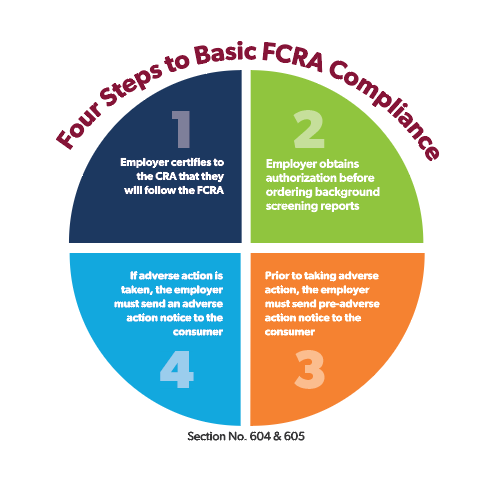The adverse action process is a crucial part of any employment background check. When an employer uses a background check to make decisions about hiring, promotion, or retention, they must follow specific steps outlined by the Fair Credit Reporting Act (FCRA) to ensure the process is fair to the candidate or employee. If adverse action is taken based on the results of a background check, it means the employer is considering a negative action, such as not hiring, demoting, or terminating someone, based on the information found.
Here’s a breakdown of the key steps involved in the adverse action process:
- Pre-Adverse Action Notice
When an employer is considering taking adverse action based on a background check, the first step is to send a pre-adverse action notice. This notice informs the candidate or employee that negative action is being considered and provides them with a copy of the background check report along with a summary of their rights under the FCRA.
The pre-adverse action notice allows the individual the opportunity to review the report and dispute any inaccurate or incomplete information.
- Reasonable Time to Respond
After sending the pre-adverse action notice, employers must allow the individual a reasonable amount of time to respond. While the FCRA does not specify an exact timeframe, it is generally recommended to give the individual five to seven business days to review the report, gather evidence, and dispute any inaccuracies with the background screening provider.
During this time, the employer should refrain from making any final decisions regarding the employment status of the individual.
- Taking Adverse Action
If the individual does not dispute the report or if, after investigating a dispute, the employer still intends to proceed with adverse action, the next step is to issue an official adverse action notice. This final notice informs the individual of the negative decision and provides additional information, including:
- The name, address, and contact information of the background check provider.
- A statement that the background screening company did not make the adverse decision and cannot provide the reasoning behind it.
- A notice of the individual’s right to request a free copy of their report within 60 days.
- A notice of the right to dispute the accuracy or completeness of the report.
- Compliance with State and Local Laws
It’s important to note that many states and cities have their own regulations that go beyond the FCRA’s requirements. For example, some jurisdictions may require employers to follow specific timelines or provide additional information during the adverse action process. Employers should always be aware of any state or local laws that may affect the process.
Why Is the Adverse Action Process Important?
The adverse action process ensures transparency and fairness in employment decisions. By following this process, employers minimize the risk of non-compliance with FCRA regulations and protect themselves from potential legal disputes. More importantly, it allows candidates and employees the chance to correct any mistakes in their background reports that could otherwise unfairly impact their employment opportunities.
Partnering with a Trusted Background Screening Provider
The adverse action process can be complex, especially with the added layers of state and local regulations. This is where partnering with a trusted background screening provider like Alliance 2020 can make a big difference. We help guide employers through each step of the process and our system conveniently allows you to send out the required notices. If you have any questions about the adverse action process, please contact us!




